Womena is a Dubai-based, women-only angel investor group serving the Middle East and North Africa, or the MENA region. Through professional networking, investment guidance and thorough research on startups in the region, Womena connects promising startups in the growing economy with high-net-worth women investors. Here, Womena shares insights on the importance of pitching when raising funds for a startup.
womena.co - Strong pitching skills are critical to a startup’s success. To receive investment at any stage of the funding life cycle, a startup will usually need to pitch many times, be it to WOMENA members or a venture capitalist. Entrepreneurs may find themselves pitching their company hundreds of times over the company’s lifetime. Hence, it’s important an entrepreneur hones these pitching skills early on for the best chance of success. While the pitching process may seem mystifying and intimidating at first, there are a few simple things an entrepreneur can do to boost their chances of success.
Check out successful pitches online
There are a plethora of websites out there with advice on what to include in a pitch and videos of startups pitching at demo days around the world. These give you a really good idea of what you need to do and you can pick and choose the best parts from each pitch you watch. Do this before you prepare your own pitch, particularly if it’s your first time.
Refine your pitch to the audience
Every pitch is different but most entrepreneurs give the same pitch to each investor. Entrepreneurs pitching to the WOMENA members might want to highlight how their company is targeting women, for example. The point is that each investor is different and each pitch should be too to reflect that difference.
Keep it short and snappy
An investor might hear dozens of pitches over the course of the week. If an entrepreneur doesn’t hack it right from the start, the rest of the pitch is going to be an unnecessary uphill battle. Immediately, tell them who you are, what the problem is and how your company will solve it. If your pitch is more than 10 minutes long, then you’re entering dangerous territory – the investor’s attention is probably waning (if it hasn’t already gone completely) and you need to wrap up quickly to keep that attention.
Back up what you’re saying with numbers
Numbers are an excellent and simple way to show the strength of your business and/or market. They’re easily digestible and can provide considerable insight. Make sure you know relevant statistics, you can back them up (i.e. you don’t make them up on the spot) and understand what these numbers mean. It’s very easy to state an incorrect stat but it’s so much harder to recover once you’ve been caught out.
Practice!
The idiom practice makes perfect really does hold true when it comes to pitching. The more you practice, the more comfortable you will be pitching to investors. Practice with friends, colleagues, advisors … anyone really. Get feedback too! The people you practice with could have some very useful advice.
Look the part
Startup founders’ dress is often associated with jeans, hoodies and T-shirts à la Mark Zuckerberg. While that might be the standard dress at work, it might come off poorly to a potential investor who doesn’t have a similar tech background. Notice too how Mark Zuckerberg has smartened up in recent years? There’s a reason behind that. You want to look respectable and show the investor you mean business. This doesn’t mean wear a suit and tie: that would probably look a little odd unless you’re pitching to a very formal investor or investment company.
Visit Womena.co to learn more about Womena's efforts, like the group on Facebook and follow them on Twitter.




















